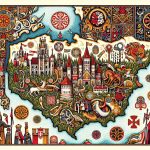
Poland is a great choice for international students because of its rich history, lively culture, and respected universities. It offers an affordable option for quality higher education.
However, figuring out how to pick the right university, fill out applications, find funding, and get used to living in a new country can feel overwhelming. This guide is here to help make these steps clearer and easier to manage.
We’ll cover everything from scholarships and how to apply, to blending into the Polish way of life.
So, what is it about studying in Poland that makes it such a rewarding experience?
Choosing the Right University
Choosing the right university in Poland is a crucial decision for international students. It’s not just about picking a school; it’s about finding a place where you can thrive academically and personally. Poland offers a wide range of universities, from the historic ones that have been around for centuries to the modern technical institutes that are at the forefront of research and education.
When looking for a university, you should start by thinking about what you want to study. Poland’s universities have their own strengths. For example, if you’re interested in engineering, the Warsaw University of Technology is renowned for its programs. On the other hand, Jagiellonian University in Krakow is one of the oldest in the world and is well-known for humanities and sciences. Matching your interests with the university’s strengths is key.
Location is another important factor. Cities like Warsaw, Krakow, and Gdansk offer rich cultural experiences but living costs can be higher. Other cities might offer a quieter study environment and lower living costs. Consider what kind of experience you’re looking for outside the classroom.
The reputation of a university is a good indicator of the quality of education you can expect. Look at university rankings, but also read about the experiences of alumni. Success stories of past students can give you a glimpse into your potential future.
Application Process Simplified
Choosing the right university in Poland is just the beginning for international students. The next important step is getting through the application process without a hitch.
This journey starts by filling out an online application on the university’s website. It’s not just about entering your name and grades; you need to provide detailed personal and educational information. You’ll also upload key documents like your high school diploma, proof of your ability to speak English or Polish, and a passport-sized photo. Depending on what you’re planning to study, you might also need to add a personal touch with a statement about yourself, letters from people who recommend you, or even a portfolio if you’re eyeing an arts program.
Once your application is in, the waiting game begins. Some courses might call you in for an interview or ask you to sit an entrance exam. It’s crucial to keep an eye on deadlines and make sure any documents you provide are in English or Polish, as the university requires.
Let’s break it down with an example. Imagine you’re applying for a computer science program. Alongside the usual documents, you might showcase your coding skills through a portfolio of projects you’ve worked on. This not only proves your proficiency but also sets you apart from other candidates. If an interview is part of the process, preparing examples of how you’ve solved programming challenges can be a great way to demonstrate your thinking process and expertise.
In every step, clear communication is key. Avoid jargon and keep your language simple, just like you’re explaining your application journey to a friend. Remember, the goal is to make your application stand out by being both comprehensive and easily understandable.
Scholarships and Funding
For international students planning to study in Poland, understanding the different scholarship and funding options is essential. The Polish government, universities, and various international organizations offer a broad spectrum of financial support. These scholarships can cover tuition, living expenses, and in some cases, even travel costs. For example, the Polish National Agency for Academic Exchange (NAWA) runs the Ignacy Lukasiewicz Scholarship Programme, designed specifically for students from developing countries. This is a prime example of how targeted financial aid can help bridge the gap for those in need. Additionally, numerous Polish universities engage in partnerships with institutions abroad, creating scholarship opportunities for exchange students. It’s vital for prospective students to research these options and apply early to secure their financial support.
Let’s dive deeper into how you can go about this. Start by listing the universities in Poland you’re interested in and visit their official websites. Look for the ‘International Students’ section where you’ll often find detailed information on available scholarships. Don’t hesitate to reach out to the universities’ admission offices for personalized advice. Moreover, exploring the NAWA website can offer insights into government-funded scholarships, eligibility criteria, and application deadlines. Remember, applying for scholarships is a competitive process. Tailor your application to highlight your strengths and how you align with the scholarship’s objectives. By taking these steps, you’re not just seeking financial support; you’re also showcasing your dedication and proactive approach to your education journey in Poland.
Life in Poland
Moving to Poland for studies introduces students to a diverse cultural setting, alongside promising educational and practical aspects. Poland’s education system stands out for its quality across various fields like sciences and humanities, offering many English-taught programs. This feature is particularly beneficial for international students. Compared to other European nations, living in Poland is more affordable, which is a significant advantage for those trying to manage their expenses effectively.
When it comes to housing, students have options ranging from university dorms to private apartments. This choice allows them to balance their budget and personal preferences. For getting around, Poland’s public transport system is both efficient and economical, making both daily commutes and leisure explorations hassle-free.
Healthcare in Poland is accessible to students through mandatory health insurance, ensuring they receive necessary medical services without undue financial strain. This aspect underscores Poland’s commitment to student welfare.
Beyond the practicalities, Poland’s rich historical backdrop offers a unique learning and living environment. The country’s welcoming atmosphere fosters a supportive community for international students. For instance, exploring the historic city of Krakow or participating in local festivals can enrich students’ experiences, blending education with cultural immersion.
Cultural Integration Tips
To make your transition into Polish culture as an international student easier, it’s crucial to dive into the local way of life. Poland has a vibrant culture, shaped by its long history. A good starting point is to learn some Polish. Even basic phrases can help you connect with locals and show that you respect their culture.
Imagine walking into a local bakery and ordering your bread in Polish or thanking someone in their language. These small gestures can open doors to deeper interactions and friendships.
Participating in Polish festivals and public holidays is another great way to immerse yourself. For example, attending the colorful Krakow Christmas Market or the lively Midsummer Night (Wianki) celebrations not only gives you a taste of Polish traditions but also allows you to bond with the community.
Joining university clubs or local groups that focus on cultural exchange can also be beneficial. These groups often organize events, language exchange sessions, and outings, providing a supportive environment for learning and sharing cultural experiences. For instance, a photography club might organize a trip to capture the autumn colors in the Polish countryside, offering both a cultural experience and an opportunity to make friends.
Understanding Polish social norms is equally important. For example, Poles often value directness but also politeness in conversations. Knowing when to offer a firm handshake (usually in professional settings) or when a simple smile will suffice (in casual encounters) can help you navigate social situations more confidently.
Conclusion
Choosing to study in Poland is a great decision for international students. It offers a complete academic experience, thanks to a variety of universities, an easy application process, and plenty of scholarships and financial aid options.
Besides the studies, living in Poland lets you dive into a country rich in history and cultural variety, adding something special to your education. To make the most of your time in Poland, getting involved in the local culture is key.
This way, your time studying abroad isn’t just about hitting the books; it’s also an unforgettable adventure.






Comments are closed.